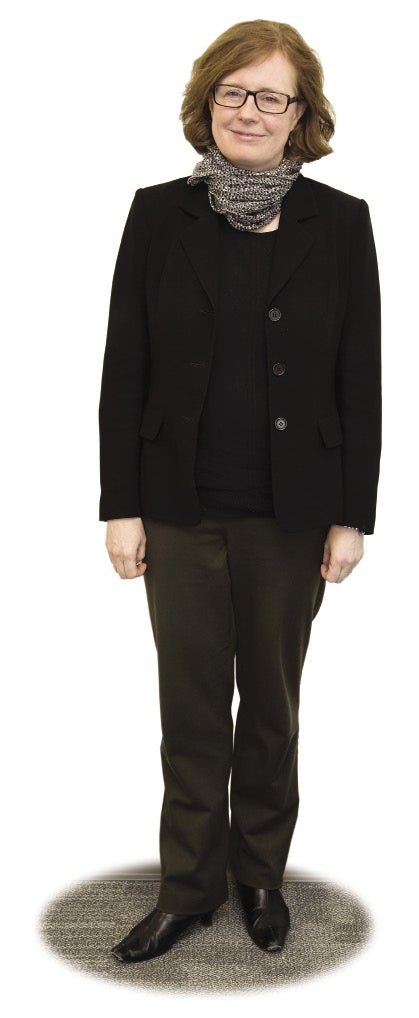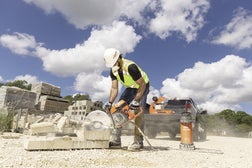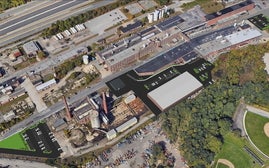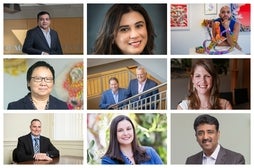
Q&A with Anne Hardy, Director, Saint-Gobain Research and Development Center
 Anne Hardy, Director, Saint-Gobain's research and development center, Northborough
RESIDENCE: Acton
EDUCATION: Bachelor's degree, University of Utah; Ph.D., MIT
Anne Hardy, Director, Saint-Gobain's research and development center, Northborough
RESIDENCE: Acton
EDUCATION: Bachelor's degree, University of Utah; Ph.D., MIT

Anne Hardy was recently honored by The Manufacturing Institute with its Women in Manufacturing STEP (science, technology, engineering and production) Award. The award honors women across all levels of the manufacturing industry who have demonstrated excellence and leadership in their careers. Hardy, who holds 10 patents, has been with Saint-Gobain since 1992, achieving several research-and-development positions with the international manufacturer.
When you received your award last month from The Manufacturing Institute, you mentioned your grandmother as a role model and how she was not intimidated. Does that sense of fearlessness help women succeed in fields tied to science and math?
I think you need to be a little fearless. Interestingly enough, my grandmother was not a scientist. But she was fearless in being able to take her knowledge from all sorts of different fields. When I think of women who are working in science, I think there is an element of fearlessness that goes into it because it's not always seen as a traditional area that women are going to work in.
Regardless of gender, what's the biggest risk for the United States manufacturing industry if we don't generate enough STEP or STEM graduates from our colleges?
I think manufacturing is a valuable component because it adds so much value back into the economy. We need people who have a strong basis in math and analytical types of thinking and engineering. Without those skillsets, then we can't actually advance the kinds of areas that we're interested in growing within the country.
You have also taken on a role as a liaison of sorts to universities. What are the things you emphasize to college students who are studying the STEM or STEP fields?
One of the things that we emphasize, and we emphasize it with our own employees as well, is that there are some basic things you need to be good at when you're in (STEP or STEM) fields. But it's also important that you be able to communicate … it doesn't matter if you think you're a geeky math or a science person, you still have to sell your ideas, you still have to be able to communicate what it is that you want to do. You need those skills that sometimes engineering people see as soft skills. And those are just as important sometimes as the math and engineering skills.
So they see it more as like an add-on or, 'Well it's not quantitative,” so it doesn't matter as much?
Yes. When we talk with people when they come here — because we hire lots of bright people who have done well in school … One of the things we tell them is that you need the soft skills to complement the hard things that we hired you around. And sometimes that's an eye-opener.
Does the patent system work effectively? Or does it need tweaking?
The United States has adopted the patenting system that is used in most of the world with “first to invent.” That makes things a little bit easier. Sometimes patents are being reviewed by people who aren't experts in (a) certain area and (there's) always the challenge of having to explain something that's unique. One of the things you have to show is that what you've done is not obvious. But sometimes it's hard to explain what is not obvious or what is obvious to someone who's not experienced in that field.
What's the most challenging part of your role?
Probably making sure that we have good people. We spend a lot of time looking at how we recruit: people who can be strong, people we can build our organization on. And when we have good people, we (get them) working on challenging projects and things seem to flow pretty well.
And what's the most rewarding?
Watching people come in and being really excited about the projects that they're working on, being excited about what they're doing, watching projects succeed, finally getting it to manufacturing and those “birth moments” of projects getting launched. They're all based on people.
Video
Anne Hardy, Saint-Gobain research and development center, Northborough












0 Comments